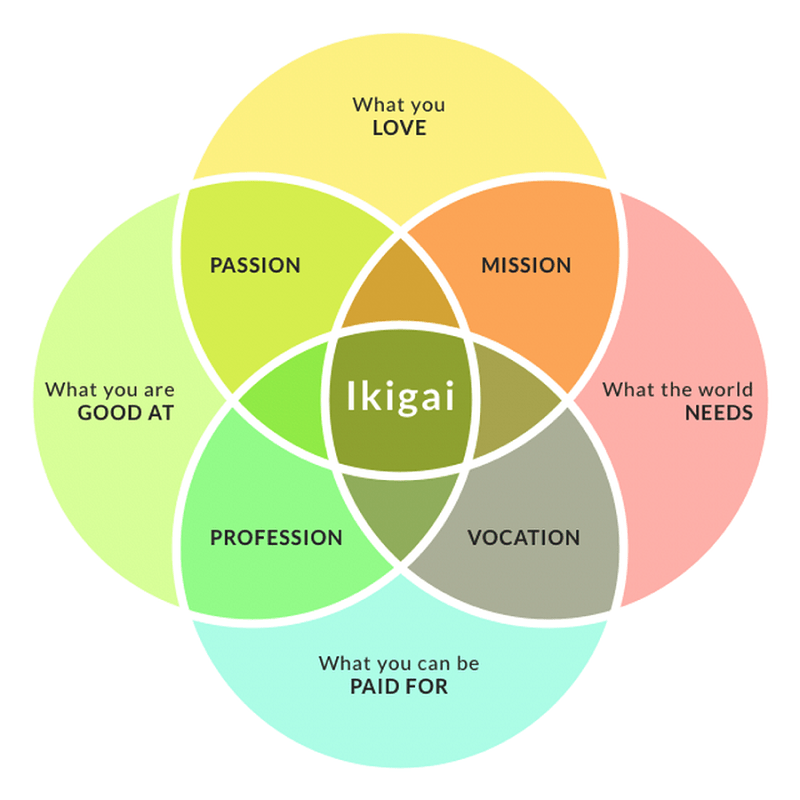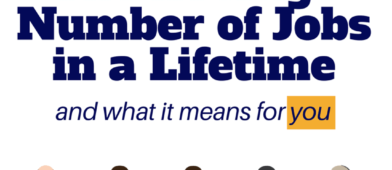What if the answer to life, the universe, and everything wasn't 42?
What if I told you there is a simple formula for life, and it can be expressed in one word?
Our neighbors across the Pacific Ocean have it all figured out. Ultimate fulfillment is described by the Japanese word ikigai (derived from iki, which means life, and kai, which means value).
Ikigai is a simple concept when it comes down to it. It is the balance between what you are good at or passionate about, and what the world needs and will pay for. It is what gets you up in the morning and keeps you going throughout every day for the rest of your life.

How I Found My Ikigai
While ikigai paints a simple picture, finding that balance is not so easy. Even though I appreciate the straightforward diagram, the pursuit of ikigai in my own life has proven to be a bit tricky.
What I Value and What Pays Me
My work as a software engineer keeps me challenged—something I value highly. Every day without fail I learn something new.
It's also impossible to ignore the money motivator of my job. Software engineering is a highly paid profession and the job market is clamoring for more coders. I'm in the top 5% earners for my age bracket; that's not something to complain about!
However, since you know all about the secret to life, the universe, and everything, you may notice that some pieces of ikigai are missing here. I'm not in love with the work that I do. That lack of passion translates into work that is less rewarding– and it certainly comes less easily to me than my real passion: writing.
What The World Needs and What I Love
In high school, I was the nerd who enjoyed hanging out with my literature professors. I spent my lunches editing the school literary magazine “Serendipity.” English classes were easily my favorite, and I considered myself a decent writer.
Two moments stand out in my mind. One day in class, we recited sonnets we wrote and a classmate looked at me slack-jawed and said, “You wrote that?!”
Then, in my junior year, our teacher passed back out graded Shakespeare analyses face down as she lectured us about how we had disappointed her. “Only one person in this entire class received a 100. I want to see better from you next week,” she said.
I peeked at my score and my grade encircled in red pen: 100.
I'm not telling you this to brag. I just want you to understand that writing just clicked for me. I felt the energy in bringing a pen to paper and crafting what I wanted to say. It felt effortless, I loved it, and I had external validation to complement the internal motivation to write.
Contrast that to my math classes, where I studied late into the night, crying over Laplace transforms. I did well in the classes, but it took significantly more effort and time. When I finished my AP Literature exam, I felt exhilarated. When I solved the last equation on my AP Calculus exam, I felt like I could sleep for the next three days. In high school, I comforted myself by reminding myself that I wasn't going to be an engineer or anything.
Then what happened, dear reader? I became an engineer.
What to do when ikigai is not balanced
While the diagram looks simple, I have been struggling with each quadrant of ikigai, attempting to wrestle them into place. When I get one pulled closer, trying to achieve that clean overlap, another element repels away like two south poles of a magnet. The career I would love doesn't pay well, and the career that pays well I don't love.
Luckily, I have a few options:
- Do my day job until I'm financially secure, then take on a less fiscally-responsible, more fulfilling career.
- Quit my day job and try to turn writing into a financially viable career.
- Find ways to incorporate things that I love into my day job.
- Keep my day job and do a side-hustle at night.
I have thought about each option in detail with how best to achieve a balance of ikigai.
1. Do my day job until I'm financially secure, and then take on a less fiscally responsible career.
This strategy is all about delayed gratification. The engineering job would ultimately be a means to an end. I would save and save until that quadrant of ikigai is fulfilled, and then take on the other three quadrants by finding something I love to do, something the world needs, and something I'm good at without worrying about financial pressures.
I can already anticipate the responses. What kind of life is one that is lived for the future? What about now? If ikigai is all about what gets you to wake up in the morning, it's not something to delay until later. Ultimately, this solution is appealing to me, but I recognize that the longer one spends without the balance of ikigai, the more unhappy one will be in the short term. If I decide to choose this route, I will need to find other things besides work to make me happy for the time being.
2. Quit my day job and try to turn writing into a financially viable career.
I love to write, I'm good at it, and I think it makes an impact on those around me. However, we all know that it isn't easy to cut it financially as a writer. A 2018 study by the Author's Guild found that incomes for authors and writers have fallen to historic lows at a median of $6,080 in 2017. Respondents who identified themselves as full-time book authors still only earned a median income of $20,300. (Payscale shows a more optimistic picture at a median salary of $50,994, although that number comes from a smaller sample of 100 writers and authors compared to 5,067 surveyed by the Author's Guild.)
For the risk-takers and entrepreneurial spirits, casting off the chains of a day job and leaping into the arms of a beloved passion is surely appealing. However, following your passion is not always the best advice. I am not much of a risk-taker, and the trope of being a “starving artist” does not appeal to me.
The hazard of missing that financial leg of ikigai is enough to stop me from chancing this option.
3. Find ways to incorporate things that I love into my day job.
I can incorporate more of what I enjoy into my work, or even transfer into a new role with a mix of both. When I told my team's UX Designer that I enjoy writing, she offered to let me write some of the copy for the website we work on. The bane of many software engineers' existence is documentation and variable naming — which I find fun. There is even a job title that blends my day job and my passion: technical writer.
Rather than taking on a new job title altogether, I could also switch companies and therefore overall responsibilities. Instead of working at a large company where “engineer” is my only hat, I could switch to a smaller startup where I could take on some more creative tasks.
This option appeals to me and would likely be a shift over time as I carve out priorities, job hunt, and craft an occupation that hits every element of ikigai. I don't think this solution is easy or quick; but with some effort over time, I think a balance could be struck.
4. Keep my day job and do a side-hustle at night
Right now, this is my current answer. My job doesn't fulfill each element of ikigai, and I posit that it doesn't have to! There are many hours in a day, and several ways to fill any voids of a job.
I spend my days solving complex problems and coding. I spend my nights and weekends writing for my blog Financial Mechanic.
Some people may strike the jackpot with a job that realizes their: passions, values, skills, and monetary needs; but trying to find all of that in a job can feel like a fruitless endeavor. My combination hits every element of ikigai from different approaches. I can write a project on the side, slowly attempting to turn it into a viable money maker, while at the same time seeking ways to make my day job a little more fulfilling overall.
That's my ikigai.
It's not perfect, but it gets me out of bed every day.
How To Find Your Ikigai
To help with finding the balance, there are three simple questions to ask yourself. It may help to grab a pen and paper and write it out.
Step 1: What are you good at?
Step 2: What do you enjoy doing?
Step 3: What do you value?
Your list should have things that give you a sense of purpose. There should be things that you get excited about doing. Be sure to include skills and strengths that make you feel proud.
After you have your list, draw lines between the similarities. Can you create a job with the intersection? Is there a way to bring in money and therefore hit all the different elements of ikigai?
Since I struggled so much to figure out the balance of ikigai in my life, I wanted to hear from other people who feel fulfilled by their work and mission. I asked three people who believe they have found their ikigai and made their lists by answering those three questions.
Military Dollar
Start By Paying The Bills– Then Add Passion
Military Dollar has undoubtedly found her ikigai in her career in the military. “It's both highly technical and very much about relationships, leadership, and strategies.” For her, being a part of the military is more than just a job. “It's not just coworkers and a paycheck, it's a life.”
It's inspiring to hear from people like Military Dollar who truly have a passion for what they do. If you are not currently in a job that fulfills you, she suggests that the starting place is to find something to pay the bills and make moves to improve it over time.
“While doing that job, ('cause you gotta pay those bills!) look for improvements. Maybe you need to change jobs or even career fields. Maybe you just need to make incremental tweaks in your current role to turn it into something you love. But I don't recommend anybody, willingly, take a job that either doesn't pay enough or is soul-crushing.”
In other words, if your career is lacking a critical element of ikigai, it's important to take action to correct the course.
Daniella – I Like To Dabble
Ikigai Is More Than Just A Job
Daniella wears many hats in her role, which allows her to check a lot of boxes across what she is good at, what she enjoys, and what she values. She also has a few side-hustles that contribute to her overall level of satisfaction.
Daniella connected the dots between what she values (teaching people new things) with what she enjoys doing (looking at data) and what she's good at (helping people and paying attention to detail) to craft a career she loves as a senior software engineer.
It's rare to find a single career that is fulfilling on every level, so Daniella also has hobbies and side-hustles. Daniella helps people optimize their credit card rewards at her job (using those travel hacking skills!), dabbles in storytelling, and helps people through her blog. All together, everything balances to be her ikigai.
“Find something you love doing,” she advises. “Research as much as you can on growing your skillsets and experience to match that.” Ikigai is a holistic concept, so if you aren't completely happy with your career you can fill in the gaps in other ways.
Ms. Mod – Modest Millionaires
Positive Perspective Matters
Ms. Mod, a business support analyst, shares that positivity is the secret sauce to her ikigai. “Put in the effort to find happiness in your current job. There are many books on positive psychology in the workplace that can be helpful.”
Ms. Mod combined her priority of making an impact with what she enjoys doing (solving complex problems) and what she's good at (being empathetic) to be a rock star in her career.
“In my case, as I work with disputes, I could easily see it as a difficult situation where I am constantly dealing with upset people and where I have limited ability to help. However, I've made the effort of reframing it in a way that allows me to see that I am finding ways to help others while getting paid.”
Ikigai Is The Answer
Motivation is built on the foundation ofmeaningful work. How can you combine your passions into a mission that becomes a career? These three women have found their ikigai, now it's your turn.
“Maybe you'll be lucky and the job you started with will be fulfilling mentally, emotionally, and financially,” says Military Dollar. “But if it's not – because let's face it, most 18-year-olds aren't going to get it right on the first try – take the initiative to design a career you can be proud of.”
Have you considered your ikigai?




Aloha Jessica, Thank you for the reminder of Ikigai. My mom has mentioned that word when I was a kid, but I was not interested then. Ikigai has a special meaning now, in memory of my mom and her inspirational quotes. I retired early from a wonderful Accounting career and continue my passion as a Freelance Writer. Accounting satisfied my analytical, logical side and writing inspires my philosophical, spiritual self. Yes, it can be scary and exciting to follow our passion with no guarantee of financial success. My passion is followed by having faith, learning new skills, and inspiring others.… Read more »
Hi Florie,
I’m glad that Ikigai has a positive influence on your life in memory of your mother. It sounds like you have a good handle on your passions and being able to satisfy all those aspects of yourself! Anyone who finds that balance in Ikigai is an inspiration to me so thanks for sharing yours!
Hey, thanks for sharing!! This is super helpful 😀